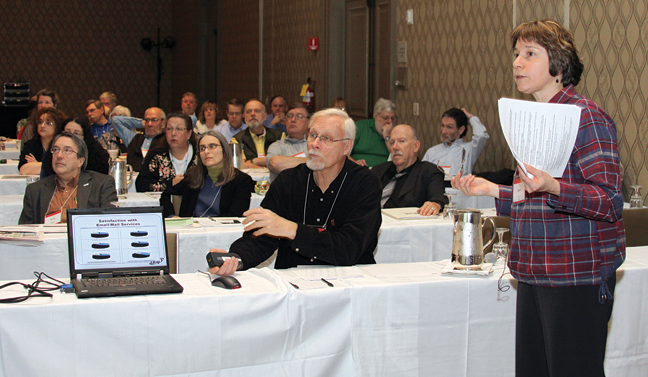|
An atmosphere of intense focus and 10-hour days helped shape UUP’s priorities for contract negotiations with the state, as members of the union’s Negotiations Team and Negotiations Committee met for three days in January to review and assess members’ comments collected over the last several months. “The individuals who have volunteered to serve on the Negotiations Team and Committee share a strong sense of purpose,” said Chief Negotiator Jamie Dangler of Cortland. “They were extremely hard-working and productive in their commitment to clarify and prioritize the issues of greatest concern to their colleagues.” The Jan. 18-20 work session in Rye brought together a group as diverse as UUP’s membership, with academic, professional, part-time and full-time employees from all campus types and chapters represented. Before the three-day session was over, dozens of posters lined the walls, each one summarizing priorities identified by seven subcommittees charged with going over members’ input on specific terms and conditions of employment. The work session included a presentation by NYSUT/UUP Labor Relations Specialist Ed Giblin on mandatory, non-mandatory and prohibited subjects of negotiations. “Before the Team and Committee could be expected to thoroughly review and discuss the data, they needed to be clear about exactly what UUP can address at the table,” Dangler said. “It was extremely helpful to have the expertise of a labor relations specialist go over the rules and regulations of collective bargaining.” MEMBERS’ COMMENTS COUNT The seven subcommittees drew on a number of resources in assessing members’ concerns. Throughout the fall, members of the Negotiations Team embarked on a dedicated listening tour of every chapter in the state, where they heard members’ questions and opinions during chapter meetings. Information was also collected through task force and committee reports, during an open hearing at the 2010 Fall Delegate Assembly, and in face-to-face talks with members. The subcommittees also studied the results of a comprehensive online negotiations survey and member suggestions forms. “This was the first time UUP used hard-copy and electronic member suggestion forms,” said Associate Chief Negotiator Mike Smiles of Farmingdale. “This greatly increased the number of responses.” The union’s Ad Hoc Advisory Committee, which consists of one professional and one academic from every UUP chapter, also gathered information. Ad hoc members came up with a variety of ways to encourage colleagues at their chapters to share ideas, concerns and anecdotes regarding salary and other terms and conditions of employment. Among them: questionnaires, special department rep meetings, and focus groups. Negotiations Committee member Carol Braund is confident that members’ voices were heard. “I was very impressed by the process. The survey and member suggestion forms gave individuals a chance to say what they felt was important—and the privacy to know that it could be returned without identification,” said Braund, UUP chapter president at Upstate Medical University in Syracuse. “It definitely met my expectations in terms of encouraging people to be involved and sharing their thoughts.” GETTING IT DONE Armed with members’ comments and tabulated results from the negotiations survey, subcommittee members hunkered down with the paperwork and quietly went about categorizing the comments and rating the frequency of concerns. Each group summarized their issues and made oral presentations to the full group. “Our group worked well together,” said Lori Nash of Oswego, the academic part-time representative on the Negotiations Committee. “We quickly agreed on how we would approach the work we had to do. There was a lot of agreement about the issues that were in the member input, so everything moved along quite smoothly.” What’s next in the process? The Negotiations Team has a full schedule of meetings in February and March to prepare specific language for the package of proposals that will be presented to the state and to proceed with other preparations for negotiations. The Negotiations Committee must accept the conceptual proposals before the Team can sit down to bargain. There is no time frame for when the two sides will meet to exchange proposals. Gov. Andrew Cuomo must first put a negotiations team in place. The contracts of the state’s two largest unions—Civil Service Employees Association and Public Employees Federation—expire April 1. UUP’s contract expires July 1. “We are unsure as to when we’ll sit down with the state,” Dangler said. “But we are sure of one thing. When we do sit down, we’ll be ready to negotiate a contract that best reflects the needs of our members.” — Karen L. Mattison
|
Warning: count(): Parameter must be an array or an object that implements Countable in /home/uuphos5/public_html/voicearchive/wp-includes/class-wp-comment-query.php on line 405


